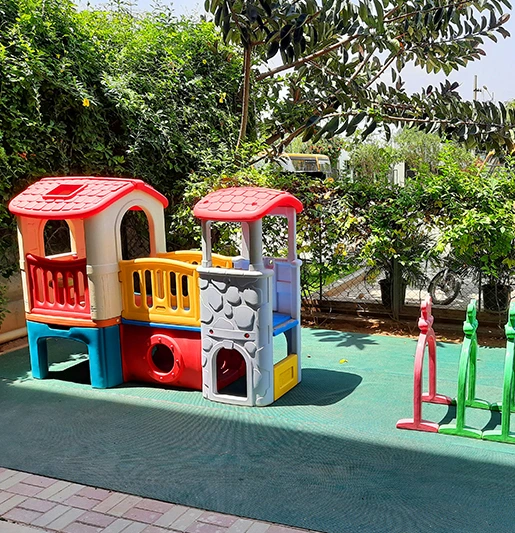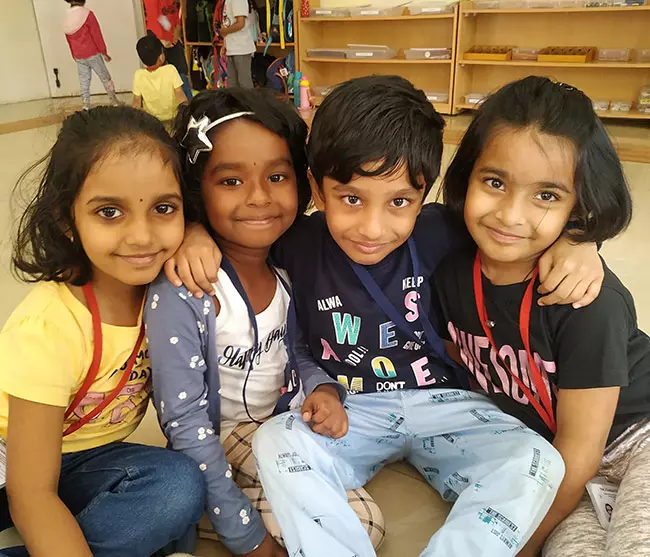



FOUNDED BY IIT/IIM ALUMNI
The Foundation Montessori PreSchool at Whitefield has created a name for itself through its excellence in education since 2013. The school offers a preschool program for Nursery, LKG, UKG and Playschool level students, and follows the Montessori philosophy. Our bright and cheerful classrooms are uniquely designed to cater to the natural curiosity of young minds. We are passionate about creating a secure environment to nurture physical, emotional and social development in preschool children.
LOCATION IN BOREWELL ROAD, WHITEFIELD
The Foundation Montessori Preschool’s centralized location on Borewell Road makes it easily accessible from Whitefield main road, Nellurahalli, Ramagondanahalli, Kundalahalli Gate, ITPL, Mahadevpura and Marathahalli. Our Montessori Preschool is walking distance from the Whitefield post office on Borewell Road, making accessibility easy for Kindergarten age group children (Nursery or Playschool, LKG and UKG age levels).
The Foundation School excels in providing comprehensive and enriching academic programs that foster a love for learning and empower students with a strong foundation for future success.
Story-telling, songs and rhymes are part of language development.
Language is taught phonetically which leads to rapid reading amongst students.
There are series of graded readers for children to master reading.
The journey starts with Colouring, Joining of dots, Free-hand-drawings, Line-pattern drawing, Tracing of alphabets and numbers
Children learn to write cursive letters first and then move onto writing words, sentences and creative-writing.
Counting goes together with recognition of numbers and number sounds. Higher order numbers are taught through decimal system.
Students also learn concepts of addition, subtraction, 2-D/3-D geometrical objects, gradation, etc.
Prominent Indian festivals / events are celebrated in school.
Children also participate in various Arts/ Craft, Theatre, Music and Dance program throughout the year. They get several opportunities to express themselves.
Practical life materials and exercises develop physical coordination, care of self and care of the environment.
Specific materials provide opportunities to practice buttoning, zipping, lacing, pouring, scooping, sorting activities, polite manners, etc.
Sensorial materials enable activities and exercises for children to experience natural order of the physical environment, e.g. attributes like size, colour, shape and dimension. They also includes finetuning the sense of touch, weight, temperature, smell and taste.
Besides learning to read and write, students learn logical thinking, patterns, sequencing, spatial relationships, etc. Story-telling, songs and rhymes are part of language development. Language is taught phonetically which leads to rapid reading.
There are a series of graded readers for children to master reading.
Children learn counting along with recognition of numbers and number- sounds. Higher order numbers are taught through the decimal system. Students also learn concepts of addition, subtraction, 2-D and 3-D geometrical objects, gradation, etc.
The journey starts with colouring, joining of dots, free-hand-drawings, line-pattern drawing, tracing of alphabets and numbers. The journey continues onto writing of words, sentences and creative writing.
Curriculum is enriched with various concepts such as animals, seasons, day-and-night formation, etc. Prominent Indian festivals and events are celebrated in the school. Children also participate in various Arts/ Craft, Theatre, Music and Dance program through the year.
Practical life materials and exercises cater to a young child’s natural interest in development of physical coordination, care of self and care of the environment. These activities help build confidence and develop a sense of belonging with respect to the environment around them. Specific materials provide opportunities to practice buttoning, zipping, lacing, pouring, scooping, sorting activities, polite manners, etc.
Pattern identification and development of relationships between objects promotes logical thinking. Various techniques such as naming, matching, sorting, categorisation, identification of functional relationships, exploration of spatial relationships etc. are carried out.
This is the age when children’s senses absorb everything in their environment. The sensorial materials provide a range of activities and exercises for children to experience the natural order of physical environment, including attributes such as size, colour, shape and dimension. Children particularly enjoy activities that fine-tune their sense of touch, weight, temperature, smell and taste.
Parents are advised to call each school for seat availability. Enquiries for admissions can be done throughout the year. Please fill the admissions enquiry form below, in which you can select the relevant branch where you are seeking admissions. At time of admission, parents need to submit the set of documents listed below. In case of any queries or clarifications, more information can be obtained at the respective school.
With over 12,000 square feet of space, The Foundation Montessori PreSchool at Whitefield provides a warm, caring, safe and nurturing environment. With over 9 large fully equipped classrooms to explore, the school provides stimulating Montessori Preschool environments for children to learn, observe, reflect and practice. Dr. Maria Montessori believed that children learn by doing. Therefore, the school has a garden, a nature study area and play areas for children to learn. The school takes pride in having the best infrastructure such as an age-appropriate Library and a Performing Arts center, where children at Kindergarten age levels (Nursery or Playschool, LKG and UKG age levels) learn dance, drama and music. Further, there are clean toilets, a separate kitchen, and a room where children can rest.


The Foundation Montessori PreSchool’s teachers are trained and experienced in the Montessori methodology. A coordinator, who is also a Montessorian, oversees all activities. Our teachers work with students at all preschool Kindergarten age groups such as Nursery or Playschool, LKG and UKG, using the Montessori philosophy. The staff consists of caring Akkas who maintain a clean environment, help children with personal hygiene and keep a hawks eye out for the safety of each child.
The school offers transport services from the Whitefield branch, for those who would like to avail of it. The school runs a combination of vans and buses for both pick up and drop services.


Daycare Facility: Students from the Whitefield branch and the Gunjur branch can avail of the day care facility at the Foundation Montessori Preschool’s Whitefield branch. A variety of activities are conducted to keep students engaged.
Music, Art and Dance help children in a multitude of ways. According to research our brains are wired differently for each of these activities. For example, children who are unable to understand concepts through verbal means, can easily understand them when they sing it in the form of a song.
Music, Art and Dance help children in a multitude of ways. According to research our brains are wired differently for each of these activities. For example, children who are unable to understand concepts through verbal means, can easily understand them when they sing it in the form of a song.
Activities such as painting and craft help children think and express themselves. Similarly, dance helps not only in abstract expression, but it also helps improve body-eye coordination and develops gross motor skills.
The academic environment cannot be disconnected from the physical development of the child. Several studies have shown that good health is connected with learning abilities in a child. Therefore, we take the child’s physical health seriously. Children are exposed to both indoor and outdoor sports. They are taught in a way to enjoy sports so that it becomes a part of their life.
The academic environment cannot be disconnected from the physical development of the child. Several studies have shown that good health is connected with learning abilities in a child. Therefore, we take the child’s physical health seriously. Children are exposed to both indoor and outdoor sports. They are taught in a way to enjoy sports so that it becomes a part of their life.
At The Foundation School, students are encouraged to play a variety of sports including football, basketball, skating, cricket, throw ball, volleyball, table tennis etc. They are also taught multiple physical activities that help in the development of their musculoskeletal systems. Yoga and Taekwondo are also part of the fitness curriculum.
Our Sports Day is an amazing event with students demonstrating their talents in a variety of sports. There is something for the parents too, to make the day a memorable one.
The school conducts multiple activities and events that help students develop a variety of skills and character traits. These include events such as annual day, sports day, celebration of various festivals and national events. Along with the Montessori methodology, Nursery or Playschool students, LKG and UKG Preschool level students (Kindergarten age groups) are involved in age appropriate activities for such events.
Students are taken on several field trips during the year to a variety of places. The Whitefield Post Office, Police Station and other places such as local gardens and nurseries welcome Preprimary Montessori students from our schools. They are already accustomed to visits by Kindergarten students (Nursery or Playschool, LKG and UKG students), and take them through a safe and enriching visit within the premises. Our school arranges for transportation for these trips and our well trained Akkas and Teachers accompany the students.
The term Montessori refers to a method of preschool education created by Maria Montessori. The Montessori methodology is very popular in India and in many parts of the world. While the Montessori methodology is applicable to all age groups of students, it is most popularly adopted at the preschool level in India.
The Preschool Montessori methodology consists of a child-centric model that includes hands-on learning. The methodology encourages self-directed activities amongst children, who are guided by trained Montessori preschool teachers. Children learn at their own pace and move on to other activities only when they have mastered the current activity. Further, the Preschool Montessori method accelerates reading and writing through the use of phonetics. Lastly, the Preschool Montessori classrooms (called environments) are multiple age environments with students between the ages of 3 (Nursery age group),4 (LKG age group) and 5 (UKG age group) learning together.
Preschool Montessori students adjust quickly to regular academics when they go to grade 1. They are fully prepared, and often do better than other students in higher grades. Here is a link to a video by the founders of google, who talk about the influence that Montessori education had on them.
In a multiple age learning environment, students from the ages of 3 (Nursery age), 4 (LKG age) and 5 (UKG age) learn together in the same classroom. This method has several benefits. The junior students learn from the senior students, and this accelerates their comprehension and skills. The senior students learn patience and leadership skills when dealing with the junior students.
The Preschool Montessori methodology involves hands-on learning. Every learning topic is supported by learning materials that children use, to understand that topic. Children typically learn to use simpler material and gradually move on to more complex ones, as their knowledge increases.
All Preschool Montessori schools are not the same as they may follow the Montessori methodology to varying degrees. A good way to understand if a school follows the Montessori methodology is to see the classroom. The material is typically arranged in shelves and there is enough space for students to work on various activities. Take a look at what our Montessori environments are like in this video https://youtu.be/yn93uLnC4JM

Address:
Survey No. 173/9, 174/1 & 174/4, Halasahalli Thippasandra Village, Sarjapura Hobli, Anekal Taluk, Bangalore – 560087
Phone:
9019564974, 9019157308
Address:
Survey No. 153/4,
Halasahalli-Thippasandra Village,
Sarjapura Hobli,
Anekal Taluk,
Bangalore – 560087.
Phone:
80500 40554, 89515 06474, 93791 88967, 89511 88272
Address:
489/14, Borewell Road,
3rd Cross, Whitefield,
Bangalore – 560066.
Phone:
80500 40564, 97401 99907
Address:
No. 1, 5th Main,
4th Cross, Mallesh Pallaya,
Bangalore – 560075.
Phone:
80500 40544, 97314 18400

Address:
Survey No. 173/9, 174/1 & 174/4, Halasahalli Thippasandra Village, Sarjapura Hobli, Anekal Taluk, Bangalore – 560087
Phone:
9019564974, 9019157308
Address:
Survey No. 153/4,
Halasahalli-Thippasandra Village,
Sarjapura Hobli,
Anekal Taluk,
Bangalore – 560087.
Phone:
8050040554, 8951188272
Address:
489/15, Borewell Road,
3rd Cross, Whitefield,
Bangalore – 560066.
Phone:
8050040564, 9740199907
Address:
No. 1, 5th Main,
4th Cross, Mallesh Pallaya,
Bangalore – 560075.
Phone:
8050040544, 9731418400